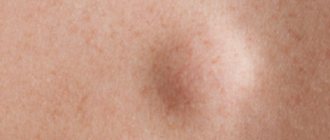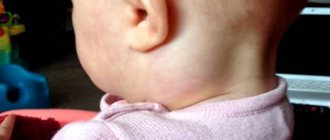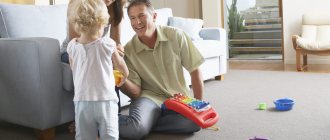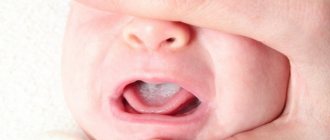Causes of restless sleep in a child
Serious disturbances, restless and anxious sleep in a young child depend on certain factors. Certain sleep disorders are influenced by exercise, diet, psychological factors, or certain medications. The cause may be a neurological mental disorder, which is often characteristic of infants. Age and health status play a significant role. It is worth carefully reviewing the possible sources of restless dreams in a one-month-old baby, as well as in children over one year old, and then determining the true cause of the illness.
Restless sleep in infants
The appearance of a little baby in the house changes the rhythm and style of life of all family members. Caring for a baby can not only be pleasant, but also cause negative emotions, such as excitement, nervousness, and anxiety. Many parents are frightened by restless and weak sleep in a 1-month-old child, especially if it is accompanied by sobs. Restless interval sleep in a 2-month-old child causes great concern, because the adaptation period is over, and nighttime rest has not returned to normal at all. Quality rest at night is an important part of quality recovery of the body. Its deficiency can cause serious consequences in an infant. Restless dreams of a baby can cause neuralgic disorders and provoke illnesses within the body. The causes of restless dreams in infants are as follows:
- adaptation to the outside world;
- an unstable emotional background can provoke restless, anxious sleep in a small child of 5 months, as well as in young children;
- loud sounds;
- dry or too humid air can become a source of anxiety during night rest and restless dreams in a 4-month-old child;
- weather dependence;
- the eruption of the first teeth often provokes restlessness in sleep in a 6-month-old baby;
- psychological barriers;
- emotional protest to something;
- stool disorders;
- colds;
- restless and anxious sleep in children 7 months old may be caused by lack of attention from parents;
- Frequent urination, leaking diapers.
A 1-1.5 year old child sleeps poorly at night
The basic cause of anxiety in children of this age is poor and poor-quality rest during the day, frequent whims, extreme excitability, and the child’s bad mood. Also, nuances with diapers can disrupt the routine at this age, because when such a hygiene item is wet or uncomfortable, the baby will definitely not be able to sleep. Also, the following may influence:
- lack of fresh air;
- unstable temperature in the room;
- possible ailments of internal organs;
- experienced mental trauma or stress;
- neurological abnormalities.
If a possible source in the form of stale air has been identified and eliminated, you can forget about disturbing dreams. If the cause of the disorder was more complex factors, night rest does not return to normal for a long time, it is worth contacting a specialist. Did you know? Babies can dream while still in the womb - from the 27th week. Dreams can be caused by the baby’s special genetic memory - the experience of previous generations. It is unknown whether dreams affect the fetus's body or not.
Causes of poor sleep in a child 2-4 years old
Anxious falling asleep, restless and weak sleep in a small child of 2 years old can be provoked by the same factors as in a one-year-old baby, especially extreme nervous excitability. Also, difficulty falling asleep and restless sleep in a child aged 3 years can be caused by a cold or nightmares. Unpleasant dreams often provoke anxiety during rest. Restless dreams in a 4-year-old child can be very conscious real nightmares, based on emotions experienced during the daytime. If a child of this age often has nightmares, it is worth contacting a psychologist to avoid neurological and mental problems, and also to eliminate the cause of nightmares.
Causes of poor sleep in a child 5-7 years old
Anxiety during the night can still be caused by illness or complications in the body, neurological or mental pathology. Restless dreams in a 6-year-old child may be accompanied by sleep talking and somnambulism. There are frequent cases of nocturnal enuresis, which often provokes a lack of good sleep in an 8-year-old child, as well as in young children. As a rule, this problem goes away by the age of nine. If nocturnal enuresis lasts for a long time, you should consult a doctor.
Why do newborns have trouble sleeping during the day?
The baby sleeps restlessly due to poor health . During the first three months, infants develop their intestinal microflora. They are tormented by pain and colic in the stomach. An 8-month-old baby experiences pain when teething. Fever, bad stool, rash, and other negative manifestations are possible.
A newborn baby does not sleep well if the diaper is too wet , leaks, or chafes. Sensitive skin becomes irritated. The baby begins to be capricious. Doctors recommend changing diapers every 3 hours and carefully monitoring the condition of the newborn’s skin.
An infant sleeps poorly when he is thirsty and hungry . The baby knows how to convey a need only through screaming, crying, and whims. Therefore, children should be put to bed after eating. Restless sleep is possible if the baby is torn from the breast too abruptly. You should wean off breastfeeding gradually.
Insufficient humidity in the room , inappropriate temperature, and stale air cause moodiness and insomnia. The nasal mucous membranes dry out, breathing becomes difficult, and the baby wakes up. The room temperature should be 16-18 degrees Celsius, humidity 60-70%. Before laying down, you should thoroughly ventilate the children's room.
Six months of age is the age of exploring the capabilities of your body. The baby learns new movements and emotions. He often wakes up, tosses and turns, yells, and whines. Parents get scared and worried if the baby flinches in his sleep. This occurs due to the active functioning of the nervous system during the REM sleep phase. This is not a pathology. Easily excitable children are susceptible to this phenomenon after an emotional outburst - joy, hysteria, resentment. But there is no need to worry when they have a good appetite, high spirits, and no signs of illness.
Other possible causes of restless sleep:
- bright daylight;
- clothing that causes discomfort: pressing seams, elastic;
- too excited state after a long walk, guests, an exciting game before bedtime;
- loud sounds;
- bad feeling;
- increased excitability due to rickets.
Infants sleep in the “rapid” phase of sleep provided by nature. It is easier for the baby to wake up when danger or discomfort appears. With age, the phases of “rapid” and “slow” sleep alternate. If the baby is tossing and turning, waking up, parents should approach the baby, calm him down, and rock him. It is easier to put a sleepy, not fully awake baby back to sleep.
The main mistakes of parents
The main mistake parents make is ignoring this problem. If the disorders are not dealt with, the baby may be susceptible to developing serious illnesses of a physiological as well as mental nature. No less serious mistakes are overfeeding at night, falling asleep late, and lack of routine.
Psychological mistakes include quarrels in front of the baby, showdowns, maternal depression, and aggression.
Also, disorders can be affected by:
- moving;
- changing of the living place;
- stress;
- problems with peers or parents aged 5-8 years.
When to see a doctor
It is worth resorting to the help and consultation of a pediatrician if symptoms of problems with night rest and falling asleep appear constantly. Especially when nightmares are accompanied by hysterics and a constant cold in the baby.
You should contact a neurologist if you have possible speech disorders, as well as developmental disorders of the baby. Also, if your little one is sick with the flu or has a cold, you should contact your pediatrician.
Physical reasons
The most common natural problems associated with the characteristics of the human body or irritating external factors:
- Moro effect (a baby’s natural reaction to fright - he shudders, throws up his arms and opens his palms, and if the baby sleeps without diapers, he will wake up from each such shudder).
- Feeling hungry or thirsty.
- Wet diaper.
- Teething, colic.
- Uncomfortable position.
- Uncomfortable clothes.
- Maturation of reflexes - during periods of mastering new skills (rolling over on his tummy, sitting up, crawling, etc.), the baby can hone them even in his sleep, waking up from his own movements.
- External factors - too high or low room temperature, insufficient air humidity, bright light, loud sounds.
Ways to normalize sleep
Without the help of a doctor, parents can take the following steps to normalize their baby's routine. First of all, it is worth creating a favorable environment - silence, a comfortable bed, peace, feeding schedule. This will help the baby fall asleep faster and normalize its routine. You need to monitor the situation in the room, the freshness of the air, and the feeding schedule in accordance with the baby’s age. It is equally important to wean a one-year-old child from night feeding and eliminate possible hiccups. Also, do not forget about a proper rest-wake regime.
Support for a comfortable microclimate
A favorable microclimate inside the room is very important for quality sleep. It will help prevent disorders of this nature and many ailments. It is necessary to ventilate the room on time, wet cleaning and cleanliness in the baby’s room are required. You need to pay attention to frequently changing bed linen to clean ones. Temperature is no less important - it should not be too cold, but not too hot. It is important to choose natural bed linen, as well as high-quality clothes for relaxation.
Creating bedtime rituals
Creating special rituals can combat restless sleep in a child at night and make it easier to fall asleep. These habits include:
- collection of toys;
- changing into pajamas;
- bedtime story;
- tea party;
- singing a song or poem;
- teeth cleaning;
- drinking milk;
- watching a cartoon.
Did you know? Falling asleep in your parents' bed can negatively impact your night's rest. A one-year-old should be accustomed to his own crib and independence. This will help save your baby from problems falling asleep in the future and stress from separation from parents during sleep.
Compliance with the regime
From the age of 1.5 years, it is worth instilling the correct sleep and wakefulness regime. This regime will help parents normalize the baby’s rest, during the day and in the evening. The correct sleep schedule, depending on the baby’s age, has a beneficial effect on falling asleep, brain function, and the correct alternation of rest phases. This habit will help make it easier to fall asleep in the future and instill the basics of proper rest. At this pace, the baby will be able to get rid of fatigue, lethargy and reluctance to play or perform minimal movements, because lack of rest directly affects the baby’s condition.
Such simple tips will help parents quickly identify possible disturbances in rest at night, determine the cause, and also improve the quality of falling asleep, and organize a normal, restful night's rest. If you experience prolonged symptoms of anxiety during your night's rest, you should definitely consult a doctor - a pediatrician or neurologist.
List of used literature:
- Giedd JN, Rapoport JL; Rapoport (September 2010). “Structural MRI of pediatric brain development: what have we learned and where are we going?” Neuron
- Poulin-Dubois D, Brooker I, Chow V; Brooker; Chow (2009). “The developmental origins of naïve psychology in infancy.” Advances in Child Development and Behavior. Advances in Child Development and Behavior.
- Stiles J, Jernigan TL; Jernigan (2010). “The basics of brain development.” Neuropsychology Review
Stages of life accompanied by “restless sleep”
There are several stages in a child's life when sleep problems arise.
The first stage is a week after birth. At this age, the baby is bothered by new, unfamiliar sensations. He is often malnourished due to the fact that his mother’s milk production has not yet improved. Therefore, the baby often wakes up and demands food. In addition, before the first bowel movement, he may be bothered by abdominal pain. Within a week, these first difficulties end: intestinal function improves, the mother's milk comes in - sleep becomes more restful and longer.
The second stage is the age from three to six months. This is the time when most children begin to experience flatulence and intestinal colic. Increased gas formation causes severe discomfort to the child. Also, at this age, the first teeth most often begin to cut, causing severe pain to the baby. These unpleasant sensations worsen at night, so restful, sound sleep is out of the question.
The third stage begins at three years of age. The child develops his first childhood fears. He begins to be afraid of the dark, negative heroes of fairy tales and imaginary monsters. And also - he gets acquainted with such a feeling as jealousy. The baby is jealous of mom and dad for everyone and often worries. All these fears cause nightmares, which often wake the child in the middle of the night.
The fourth stage is five to seven years. At this age, the child is visited by serious adult thoughts. For the first time he thinks about death, begins to fear catastrophes and natural disasters. In addition, he becomes a schoolchild, and this new role adds excitement to the person. All these experiences negatively affect the quality of sleep.
A child’s sleep, just like an adult’s, is divided into two phases:
- REM sleep is a superficial and active phase, during which a person moves, smiles, dreams and processes knowledge acquired during the day. During this phase, even minor discomfort or external irritation can wake a person.
- Slow-wave sleep is deep and calm, the body rests and grows, and the immune system is strengthened.
In infants, the REM phase takes up up to 50% of all sleep time. Therefore, they wake up quite often.











